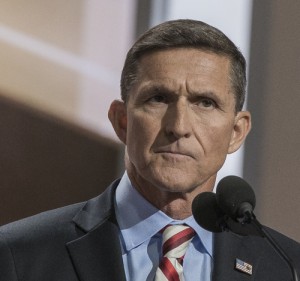Law profs ask if Flynn and a Trump transition team member violated the Logan Act

Michael Flynn/Shutterstock.com
Former National Security Adviser Michael Flynn’s admission about his discussions with then-Russian Ambassador Sergey Kislyak “leave little doubt” that he violated the federal law known as the Logan Act, according to an op-ed by two law professors.
Daniel Hemel and Eric Posner of the University of Chicago make the case for a Logan Act violation in the New York Times. The law makes it a crime for a U.S. citizen, acting without government authority, to communicate with foreign officials to “influence the measures or conduct of any foreign government” in a dispute with or “to defeat the measures of” the United States.
Flynn admitted in his plea agreement on Friday that he lied to the FBI about his December 2016 conversations with Kislyak regarding U.S. sanctions against Russia and a United Nations vote on Israeli settlements. Court records also indicated that a “very senior member of the presidential transition team” directed Flynn to contact foreign officials from Russia and other governments,
Hemel and Posner say the Logan Act “applies squarely” to Flynn, and there is also a “powerful criminal case” that could be made against the unnamed transition official.
The Logan Act reflects the principle that the president is the sole representative of the United States, according to the professors. Private citizens can’t hold themselves out as U.S. representatives and work at cross-purposes with the president’s diplomatic objectives, they write.
In one conversation with Kislyak, Flynn asked Russia to delay or prevent a vote on a United Nations Security Council resolution that condemned Israeli settlements. The Obama administration had opted against blocking the measure, and Flynn’s overture “was thus an attempt to countermand the current administration’s decision regarding a highly sensitive foreign policy subject,” Hemel and Posner say.
The other conversation asked Russia not to “escalate the situation” after the United States imposed sanctions for election meddling. That conversation “appears to be a less egregious Logan Act violation—because it was not an effort to ‘defeat’ Obama administration policy—but it too falls within the act’s prohibition on trying to influence a foreign government in a dispute with the United States,” the law professors say.
Ty Cobb, one of Trump’s lawyers, has said the Logan Act doesn’t apply to transition team members. Hemel and Posner say the claim is “surely false.” Transition team members can introduce themselves to foreign governments and discuss foreign policy, but they can’t try to persuade a foreign power “to thwart the sitting president’s foreign operations and initiatives,” the law professors say.
The law professors acknowledge that the 1799 law has only been used to indict two people, the most recent in 1852, and neither person was convicted. But that doesn’t mean the law is no longer valid, they say.



